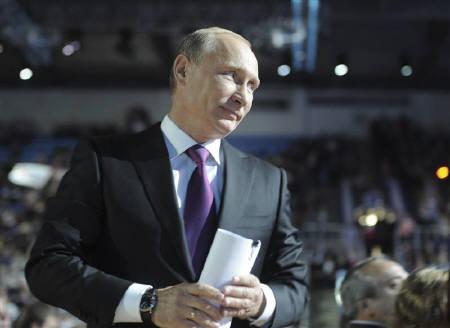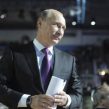
Life-Long Rule For a Self-Appointed Tsar
Publication: Eurasia Daily Monitor Volume: 8 Issue: 179
By:

Prime Minister Vladimir Putin decided to terminate the pretense of being officially second in command in Russia and announced that he will replace President Dmitry Medvedev in the Kremlin. At a congress of the ruling United Russia party in Moscow, Medvedev also announced he will not run for reelection and endorsed Putin as the next president. Putin accepted the post to the roar of approval from 11,000 party activists (Kommersant, September 26).
Putin became president in 2000 and ruled in successive four-year terms. In 2008, Medvedev was endorsed by Putin as a successor to serve for four years as a figurehead president in the Kremlin, while Putin continued as the true supreme decision-maker under the guise of prime minister. This arrangement allowed Putin to bypass the constitution that prohibits a third consecutive presidential term. Next March Putin will be elected for a six-year term as president and may be reelected in 2018 for another six years. Like any Third World autocrat, Putin is assured a landslide victory, rigged if need be. Putin’s official inauguration is planned for May 7, 2012, when Medvedev’s single presidential term expires. Putin (58) has the legal authority to rule until 2024, but it is clear he will never relinquish power while alive and may use some excuse or legal loophole to stay after 2024. Now only death or a popular revolt may ever oust Putin.
Former Kremlin insider and political adviser Gleb Pavlovsky speculated that Medvedev abandoned his intention to seek reelection because he was “intimidated or blackmailed” (Kommersant FM, September 26). To sweeten Medvedev’s public humiliation and reward his loyalty, Putin offered to appoint him as prime minister. Medvedev will run as number one in the United Russia Duma election list next December. The details of the new power sharing agreement have been a secret to many if not all the top party and government officials. Hours before the dramatic announcement on September 24, United Russia officials confidentially predicted that Putin will be number one of their Duma election list (Interfax, September 23). After the announcement First Deputy Prime Minister Igor Shuvalov told journalists: “We did not know anything beforehand, the leaders did not share information, but decided everything between themselves” (Interfax, September 25).
United Russia was preparing to run its Duma campaign using Putin’s popularity as their main election asset and now the party propaganda machine is reportedly somewhat disorientated and bewildered, since Medvedev and “his modernization agenda are much less popular.” New billboards with Medvedev’s face must be printed and the entire concept of the propaganda campaign “corrected.” Party officials do not yet know, to what extent Putin will allow his image to be used to promote United Russia’s Duma campaign or choose to distance himself from party politics and assume the position of Father of all Russia during the upcoming presidential campaign (Kommersant, September 27; Interfax, September 28). Of course, elections in Russia are shamelessly rigged by the authorities, so the ruling party will most likely find ways to secure a landslide, no matter how the vote really turns out.
In his acceptance speech at the United Russia party conference, Medvedev announced that as prime minister he will modernize the Russian economy, judiciary and political system, increase incomes, stamp out corruption and strengthen the military. As president, he utterly failed to do much of anything; as prime minster with greatly reduced power, Medvedev would most likely be even less successful. Putin’s highly competent finance minister and deputy prime minister in charge of economic matters, Alexei Kudrin, who has preserved tight budgetary discipline since 2000, told journalists in Washington he will not serve in a government lead by Medvedev, whom he accused of promoting wasteful spending on defense and social handouts (Interfax, September 25). This week, Medvedev personally assaulted Kudrin, accusing him of disloyalty while in the US (“some specially go to the US to make important statements”) and demanded an unequivocal apology or resignation. Kudrin immediately telephoned Putin, and did not apparently receive the support he expected and was fired on the same day (Izvestiya, Kommersant, September 27).
Kudrin was replaced by one of his deputies Anton Syluanov, who clearly does not have Kudrin’s capability to refuse more spending. Kudrin in turn issued a special statement, citing fundamental disagreements on budgetary spending, called the seemingly pro-capitalist Right Cause party, devastated this month by the forced resignation of its leader billionaire Mikhail Prokhorov, “a fake project that discredits liberal-democratic ideas, I will not join” and mockingly thanked those “who provided me in the recent two days with invaluable conspiratorial and political experience” – in an apparent rebuke to Putin (Interfax, September 27).
It is important for Putin to keep Medvedev content during the transition period until the election next March, while the lame duck president may still theoretically attack Putin, using immense powers concentrated in the Kremlin. After Kudrin’s ouster Medvedev continued to fume, telling military top brass during the Tsentr-2011 maneuvers: “We are not a banana republic, our defense spending will always be huge and burdening the budget.” Medvedev added, “Whoever is against [this policy], may go work somewhere else” – implying that internal and external enemies want the Russian military to be weak, so the nation disintegrates and vanishes (Interfax, September 27). It is also true that the drastic increases in defense and social spending Kudrin opposed, is as much Putin’s, as it is Medvedev’s policy. In publicly opposing additional spending, Kudrin clearly went against both and the tandem devoured him.
Putin came to power in 2000 with an agenda of radical market reforms backed by an iron authoritarian fist. The name of late Chilean dictator General Augusto Pinochet was a popular role model offered to Putin by liberal commentators. Today, with Kudrin – the last prominent liberal market reformer – ousted, with the economy and financial system state-dominated, expanding state handouts and defense spending, his role model seems to have changed from Pinochet to that of Venezuelan populist anti-American dictator Hugo Chavez – Putin’s big friend. Kudrin may be lucky to have jumped from Putin’s bandwagon as it skids to inevitable ruin.




